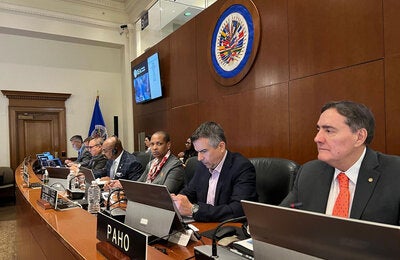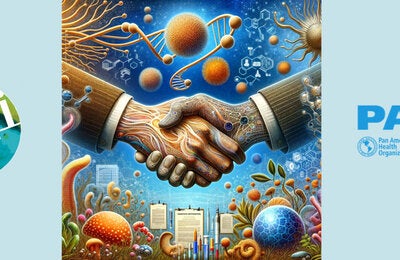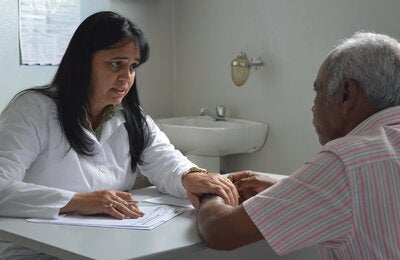
 Stigma, discrimination and violence against homosexuals and other people who have same-sex relations, also known as homophobia, and against transgender, transvestite or transexual people, also known as transphobia, are hindering the efforts to curb the HIV epidemic in Latin America and the Caribbean, a group of United Nations (UN) agencies said today, in anticipation of the observation of the World Day against Homophobia (May 17).
Stigma, discrimination and violence against homosexuals and other people who have same-sex relations, also known as homophobia, and against transgender, transvestite or transexual people, also known as transphobia, are hindering the efforts to curb the HIV epidemic in Latin America and the Caribbean, a group of United Nations (UN) agencies said today, in anticipation of the observation of the World Day against Homophobia (May 17).
Panama City, May 15, 2009 — Stigma, discrimination and violence against homosexuals and other people who have same-sex relations, also known as homophobia, and against transgender, transvestite or transexual people, also known as transphobia, are hindering the efforts to curb the HIV epidemic in Latin America and the Caribbean, a group of United Nations (UN) agencies said today, in anticipation of the observation of the World Day against Homophobia (May 17).
Evidence indicates that these populations are disproportionately affected by the HIV epidemic. But fear of discrimination tends to dissuade people from seeking HIV testing, counseling, care and, when applicable, treatment.
PAHO VIDEO: Eliminate Homophobia
The UN LAC Regional Directors' Group, representing ten UN agencies, funds, programs and UNAIDS Secretariat working in the response to HIV in the Latin American region, has urged national government and civil society to renew efforts to eliminate homophobia and transphobia.
"Stigma, discrimination and violence against homosexual, bisexual and trans people will only stop if society works against it. It is imperative to develop a supportive environment where all people are treated with dignity and respect. All citizens are part of society regardless of their sexual orientation or gender identity, but prejudice and repression have impeded recognition of the rights of sexual minorities, "said Rebecca Grynspan, Regional Director for Latin America and the Caribbean of the United Nations Development Programme (UNDP), on behalf of the group.
"This situation is improving, but not fast enough to halt and reverse the HIV epidemic by 2015, as committed by the governments," said the UNDP director. Within the UN system, UNDP is the lead agency for human rights, gender, and sexual diversity.
According to the UN, the hostility against these groups varies, but homosexual and trans people are frequently insulted, fired from jobs, and barred from community activities. Often they experience discrimination in the health services and are mistreated by the police. Every year there are reports of assaults and homicides motivated by homophobia and transphobia.
Trans people (transsexual, transgender and transvestite persons) face particular challenges, including severe discrimination and harassment in schools. Many are expelled during adolescence and have little chances of getting formal jobs.
The Joint UN Programme on HIV/AIDS will launch the document "UNAIDS: Action Framework: Universal Access for Men Who Have Sex with Men and Transgender People" , which calls for a coordinated and expanded UN response to improve the human rights situation of men who have sex with men and trans people.
"Countries in the region should observe the World Day against Homophobia as a way to strengthen human rights and build up more effective AIDS responses in the region," said Cesar Nunez, UNAIDS regional director for Latin America.
"Discrimination is an act against the essence of human beings. It gravely affects not only those who are directly discriminated against, but also their families and communities," said Marcela Suazo, UNFPA Regional Director for Latin America and the Caribbean. The International day against homophobia gives us the opportunity to create awareness of the problem and take responsibility to eliminate it."
"Hatred against people with different sexual identities or orientations is an assault on life itself and a clear violation of basic human rights, which call on us to avoid distinctions between human beings," said Mirta Roses, director of the Pan American Health Organization (PAHO). Nils Kastberg, UNICEF Regional Director for Latin America and the Caribbean, endorsed this statement.
The World Day against Homophobia was created by civil society organizations to mark the events of May 17, 1990. On that day, the General Assembly of the World Health Organization (WHO) approved the 10th Revision of the International Statistical Classification of Diseases and Related Health Problems (ICD-10). The 10th Revision recognized that "sexual orientation (heterosexual, bisexual or homosexual) by itself is not to be regarded as a disorder." In earlier versions of the Classification, homosexuality had been classified as a "sexual disorder."
"Countries should use May 17 to examine their national legislation and policies, and determine how they can be improved," said Rebecca Grynspan, in the statement, which is also available in YouTube. Examples of countries that have enacted policies or legislation to curb homophobia include, Brazil, which launched "Brazil Without Homophobia" in 2006, a comprehensive effort involving several federal and state agencies; Argentina and El Salvador, which established that health services should no longer tolerate discrimination based on sexual orientation.
In 2008, Nicaragua and Panama, the last two countries in Latin America where sex between men was criminalized, revoked such legislation. In the Caribbean, the decriminalization of consensual sex among adults was proposed during the 8th Annual General Meeting of the Pan Caribbean Partnership Against HIV/AIDS (PANCAP) last November, but homosexual behavior is still effectively a crime in seven countries.
The Regional Directors Group was created in 2003 to enhance the synergy of the United Nations response to HIV in Latin America and the Caribbean. It is comprised of the United Nations Development Programme (UNDP), the United Nations Office on Drugs and Crime (UNODC), the Office of the UN High Commissioner for Refugees (UNHCR), the United Nations Educational, Scientific and Cultural Organization (UNESCO), the United Nations Population Fund (UNFPA), the Pan American Health Organization (PAHO/WHO), the United Nations Children's Fund (UNICEF), the World Food Programme (WFP), the International Labor Organization (ILO) and the World Bank. All of these organizations are co-sponsors of the Joint United Nations Programme on HIV/AIDS (UNAIDS).
For more information:
Pablo Basz (PNUD) - (507) 305-4864
Paulo Lyra (OPS) - (1) 202- 974-3937
Rosemeire Munhoz (ONUSIDA) - (507) 305-4509



